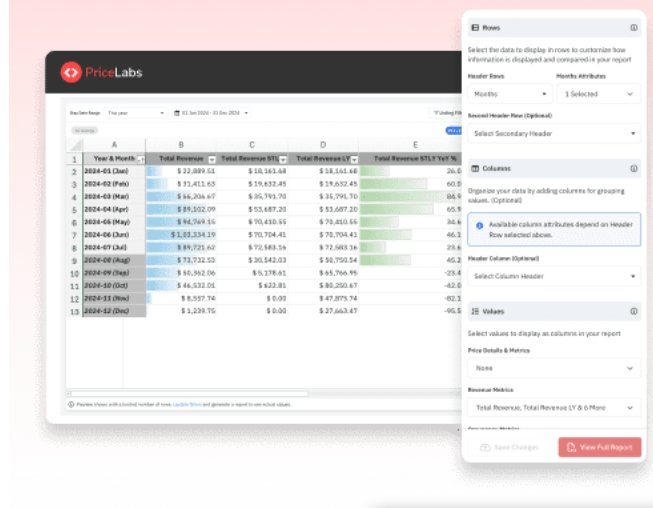[Sponsored content] Revenue management solution Beyond highlights some standout trends from its new State of Revenue Management Report.
If there’s one thing 2025 has made clear to the short-term rental industry, it’s this: the idea of a “normal year” is long gone.
Booking behavior is changing. Economic uncertainty is high. AI and automation are transforming how hosts and property managers operate. The gap between revenue leaders and those falling behind is growing wider.
In Beyond’s new State of Revenue Management Report, insights from international hosts, property managers, and billions of data points come together to reveal the trends, challenges, and opportunities shaping the market in 2025.
Here are just a few standout trends, and why now is the time to rethink your approach:
1. Guests Are Booking Later, and Operators Need to Catch Up
Booking windows are shrinking across global STR markets. In the U.S., lead times are down 11% year over year, now averaging just 26 days. France has seen an even sharper drop: 24%, down to just 19 days. Australia and the UK follow similar patterns, and the story is consistent across most global markets: guests are waiting longer to book, often hunting for better deals and more flexible stays.
The impact? Traditional data and historical data no longer provide a reliable read on demand. While they still have an important place in your strategy, forward-looking data is needed to gain an accurate picture of real-time demand.
An empty calendar in June doesn’t necessarily mean trouble for July or August. Successful operators are using predictive signals, such as guest search trends and market demand indicators, to anticipate changes and adjust pricing early.
2. AI & Automation Are Moving From Hype to Reality
AI isn’t just a buzzword anymore. It’s reshaping how STR businesses operate. Dynamic pricing tools powered by AI now respond in real time to shifting demand. Machine learning surfaces trends on booking windows, provides reporting for owners, and identifies amenity preferences. AI-driven guest messaging platforms enhance the booking experience with timely, personalised communications
Forward-thinking operators aren’t using AI to replace human judgment. Instead, they’re using it to augment their strategies and scale smarter. These tools are now driving both stronger profitability and improved guest satisfaction, with less manual work.
3. Hosts Are Diversifying Revenue Strategies—Not Just Playing With Price
Another major takeaway from this year’s report? The most successful operators are broadening their revenue management strategies well beyond simple price changes.
While dynamic pricing remains a core tactic, operators are experimenting with new revenue levers:
- Advanced merchandising: Using platform tools to test targeted discounts and promotional offers during low-demand period
- Amenity-driven upsells: Investing in in-demand features (such as pet-friendly amenities, hot tubs, or remote-work setups) that command higher rates and drive
conversion. - Smart channel management: Tailoring distribution strategies across OTAs, direct
channels, and niche platforms to maximize yield.
The industry is also professionalising. From new certifications to more sophisticated use of data dashboards, revenue management is maturing into a broader discipline, one that encompasses financial forecasting, owner reporting, and multi-market strategy.
4. Global Regulatory Shifts Are Changing the Game
Regulation remains a hot topic in 2025. From New York’s stringent Local Law 18 to Europe’s new platform data-sharing mandates, STR operators face a fragmented and fast-evolving
landscape.
In North America, policies are usually city-driven. New York’s restrictions led to a steep drop in STR listings, while cities like Los Angeles and San Francisco are experimenting with new zoning and tax rules. Canada’s major cities enforce primary residence restrictions backed by licensing frameworks.
Across Europe, new EU regulations require platforms to share booking data, while countries like Spain and Italy impose license caps and tighten oversight. Amsterdam continues refining quota systems to balance tourism with community needs.
In Australia, new laws such as Western Australia’s STR register and Byron Bay’s 60-night cap show growing efforts to manage supply, though results have been mixed.
As Beyond’s report highlights, regulation is here to stay. Operators who stay informed and engaged will be best positioned to thrive and help ensure STRs continue delivering value to local economies.
Stay Ahead of the Curve
Whether you’re a solo host, a professional property manager, or a tech-savvy investor, one thing is clear: the STR market is evolving fast. Staying competitive requires a data-driven, forward-looking approach, and an openness to adapting as trends shift.
What worked even two years ago won’t cut it in 2025. Smart operators are moving beyond static pricing and simple tools.
They’re embracing dynamic, diversified revenue strategies—and getting ready to thrive in this next chapter of STR growth.
Curious to learn more? Read the full report here, and get ready to elevate your revenue strategy for 2025—and beyond.

![New Project (19) [Credit: Beyond]](https://strz.tbcserver17.com/wp-content/uploads/2025/07/New-Project-19-800x445.jpg)





